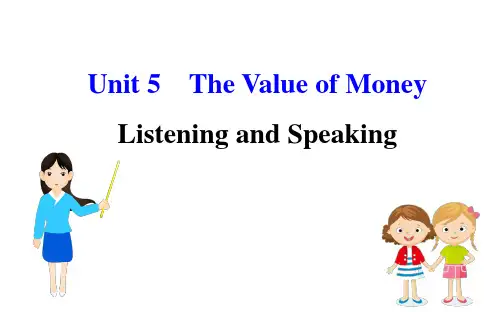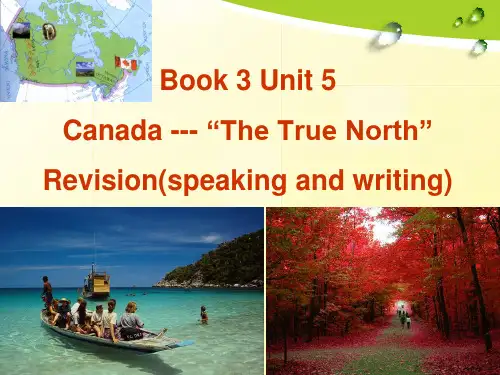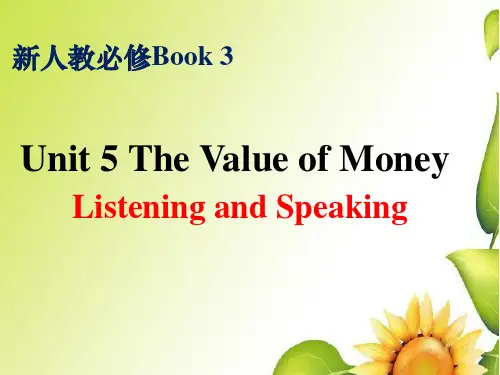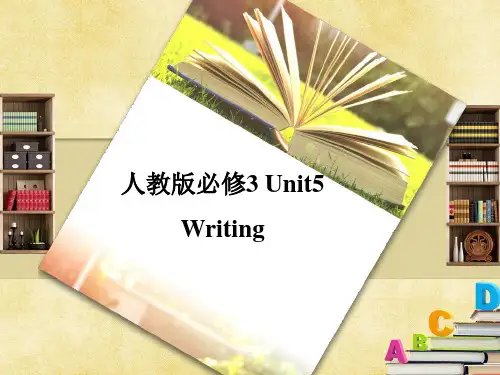人教版高二英语必修三Unit5 Speaking and writing -创新课
- 格式:ppt
- 大小:1.60 MB
- 文档页数:2
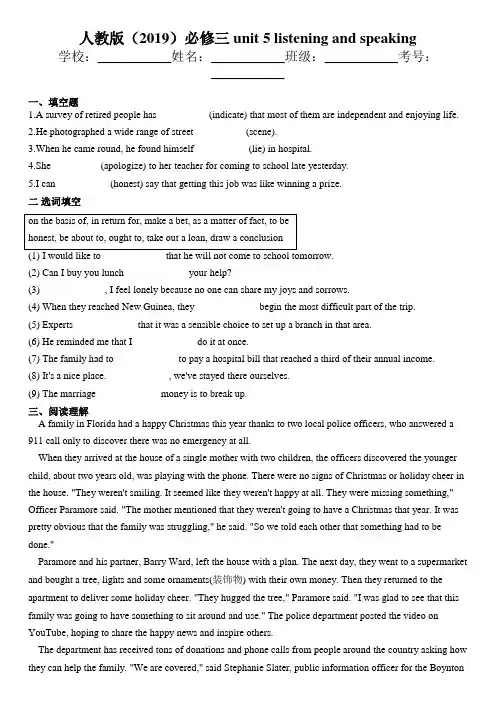
人教版(2019)必修三 unit 5 listening and speaking 学校:___________姓名:___________班级:___________考号:___________一、填空题1.A survey of retired people has __________(indicate) that most of them are independent and enjoying life.2.He photographed a wide range of street __________(scene).3.When he came round, he found himself __________ (lie) in hospital.4.She _________ (apologize) to her teacher for coming to school late yesterday.5.I can __________ (honest) say that getting this job was like winning a prize.二选词填空(2) Can I buy you lunch ____________ your help?(3) ____________ , I feel lonely because no one can share my joys and sorrows.(4) When they reached New Guinea, they ____________ begin the most difficult part of the trip.(5) Experts ____________ that it was a sensible choice to set up a branch in that area.(6) He reminded me that I ____________ do it at once.(7) The family had to ____________ to pay a hospital bill that reached a third of their annual income.(8) It's a nice place.____________ , we've stayed there ourselves.(9) The marriage ____________ money is to break up.三、阅读理解A family in Florida had a happy Christmas this year thanks to two local police officers, who answered a 911 call only to discover there was no emergency at all.When they arrived at the house of a single mother with two children, the officers discovered the younger child, about two years old, was playing with the phone. There were no signs of Christmas or holiday cheer in the house. "They weren't smiling. It seemed like they weren't happy at all. They were missing something," Officer Paramore said. "The mother mentioned that they weren't going to have a Christmas that year. It was pretty obvious that the family was struggling," he said. "So we told each other that something had to be done."Paramore and his partner, Barry Ward, left the house with a plan. The next day, they went to a supermarket and bought a tree, lights and some ornaments(装饰物) with their own money. Then they returned to the apartment to deliver some holiday cheer. "They hugged the tree," Paramore said. "I was glad to see that this family was going to have something to sit around and use." The police department posted the video on YouTube, hoping to share the happy news and inspire others.The department has received tons of donations and phone calls from people around the country asking how they can help the family. "We are covered," said Stephanie Slater, public information officer for the BoyntonBeach Police Department. "We're asking people to do good in their communities on behalf of our officers. We appreciate it very much that people are talking about this after watching the news on TV because they need to see and need to be reminded that police officers are good guys," she said. "They are human beings who have a kind heart and they do things that go unnoticed like this every day."(1) Who most probably made the 911 call?A. The mother.B. The 2-year-old child.C.A neighbor.D. Stephanie Slater.(2) What can we learn from what Paramore said in Paragraph 2?A.The family was living quite a hard life.B.The officers were angry about the wrong call.C.The family never expected they would be helped.D.The officers never expected there was such a poor family.(3) What was the two officers' plan?A. To give the family some money.B. To spend Christmas with the family.C. To post a video of the family on YouTube.D. To help the family spend a cheerful Christmas.(4) We can infer from the passage that __________.A. the family seldom had a Christmas beforeB. the video was posted to show the officers' good actC. some people used to misunderstand police officersD. police officers didn't want to be considered as good guys四、七选五Teenagers earning moneyIn the United States, you can only get a full-time job if you are 16 years old or older. But there are things that teenagers can do to earn some spending money. Here are a few ideas.Parents with young children sometimes want to go out for dinner or to the movies, but they don't want to leave their children alone. ①_______ If the children go to bed early, you can do some of your homework! Some adults have a dog, but they don't have time to take it for a walk. ②_______ So some teenagers work as dog walkers. It's a good idea—you earn money and you're outside in the fresh air. You get some exercise, too!Teenagers can deliver newspapers. You usually ride a bike around a neighborhood and leave a newspaper at each house. ③_______ You have to get up early, too, because people want to read their newspaper with their breakfast.④_______Some companies pay teens to do online research. They want to know what teens are interested in. It's a fun and easy way to make money. You can also design web pages for friends or adults.Sometimes adults pay teenagers to mow(修剪) their lawns. It's a great job because you get fresh air and exercise. ⑤_______ Then you have regular customers, because grass always grows!A. Dogs need a lot of exercise!B. It brings a lot of safety problems.C. Normally you have to have your own bike.D. Teenagers can work at home on their computers.E. It's important to tell an adult where you're going.F. Do your job carefully and people will want you to do it again.G. So, they ask a teenager to stay in the house and look after their children while they are out.参考答案一填空题1.答案:indicated解析:考查动词的时态。
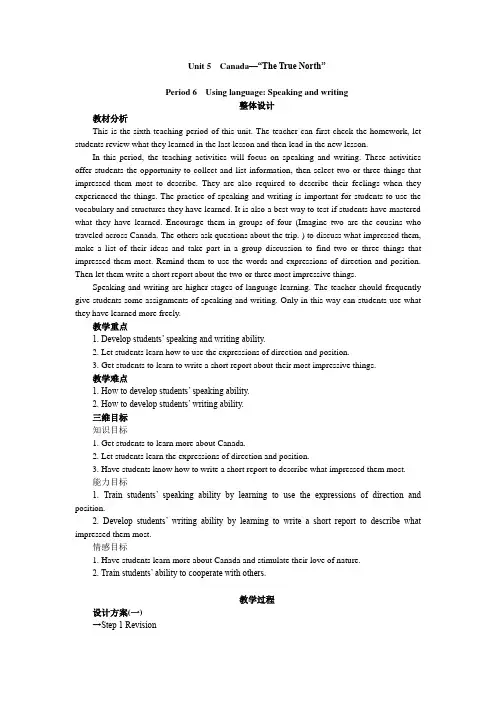
Unit 5Canada—“The True North”Period 6Using language: Speaking and writing整体设计教材分析This is the sixth teaching period of this unit. The teacher can first check the homework, let students review what they learned in the last lesson and then lead in the new lesson.In this period, the teaching activities will focus on speaking and writing. These activities offer students the opportunity to collect and list information, then select two or three things that impressed them most to describe. They are also required to describe their feelings when they experienced the things. The practice of speaking and writing is important for students to use the vocabulary and structures they have learned. It is also a best way to test if students have mastered what they have learned. Encourage them in groups of four (Imagine two are the cousins who traveled across Canada. The others ask questions about the trip. ) to discuss what impressed them, make a list of their ideas and take part in a group discussion to find two or three things that impressed them most. Remind them to use the words and expressions of direction and position. Then let them write a short report about the two or three most impressive things.Speaking and writing are higher stages of language learning. The teacher should frequently give students some assignments of speaking and writing. Only in this way can students use what they have learned more freely.教学重点1. Develop students’ speaking and writing ability.2. Let students learn how to use the expressions of direction and position.3. Get students to learn to write a short report about their most impressive things.教学难点1. How to develop students’ speaking ability.2. How to develop students’ writing ability.三维目标知识目标1. Get students to learn more about Canada.2. Let students learn the expressions of direction and position.3. Have students know how to write a short report to describe what impressed them most.能力目标1. Train students’ speaking ability by learning to use the expressions of direction and position.2. Develop students’ writing ability by learning to write a short report to describe what impressed them most.情感目标1. Have students learn more about Canada and stimulate their love of nature.2. Train students’ ability to cooperate with others.教学过程设计方案(一)→Step 1 Revision1. Check the homework exercises.2. Ask some of students to retell the passage “THE TRUE NORTH” FROM TORONTO TO MONTREAL.→Step 2 Warming up1. Let students read through the passage “THE TRUE NORTH” FROM TORONTO TO MONTREAL again and find out all the sentences that contain words and expressions of direction and position. Read them aloud and translate them into Chinese.2. Show the following on the screen. Have students read them aloud and make sure they3. Ask students in pairs to ask and answer questions using the expressions above.→Step 3 Speaking1. Have students brainstorm the question: What adjectives do you use when you describe your feelings?(excited, afraid, terrified, worried, tired, pleased, happy, impressed, surprised, amazed, satisfied. . . )2. Suppose the situation: Work in groups of four. Imagine two of you are the cousins who traveled across Canada. The others ask questions about the trip.4. Have them select two or three things that impressed them most.5. Let them make a dialogue to talk about the two or three most impressive things and their feelings when they experienced them.6. Ask as many groups as possible to perform their dialogue to the class.→Step 4 WritingTask: Write a short report about the two or three most impressive things during the trip across Canada.1. Let students make a writing plan. Show the following on the screen to help them.Be sure that your report has:1)a title2)a short paragraph to introduce the report’s topic.3)a paragraph for each impressive thing you are presenting (be sure to include its location and how it made you feel)4)a short conclusion2. Allow students enough time to write their report.3. Let some of them read their report to the class. Others should give comments.→Step 5 Writing task1. Suppose the situation: A group of visiting students are coming on a three to five-day tour of your city or town. Plan what places are best for them to visit, in which direction they will go and what the places are like.2. Remind them to use the words and expressions they have learned for geographical direction and location. Then allow them to begin to write.3. When most of them finish, let some read their plan to the class. The teacher and others should give comments.→Step 6 Homew ork1. Finish off the Workbook exercises.2. Review the contents of the unit and complete Summing Up on Page 40.3. Write your short report in the exercise book.设计方案(二)→Step 1 Revision1. Check the homework exercises.2. Ask students to dictate some new words, expressions and important sentences.→Step 2 Warming up1. Let students review the words and expressions they have learned for geographical direction and location. List them and make sure they know their meanings2. Have them brainstorm the question: What adjectives do you use when you describe your feelings? (excited, afraid, worried, tired, happy, impressed, surprised, amazed, satisfied. . . )3. Teach the new words: terrified, pleased and impressed.→Step 3 Speaking and writing1. Let students divide into groups of four. Imagine two of them are the cousins who traveled across Canada. The others ask questions about the trip.2. Have them make a dialogue to describe two or three things that impressed them most and their feelings when they experienced them.3. Ask them to write a short report about the two or three most impressive things during the trip across Canada.→Step 4 Workbook1. Speaking task1)Ask students to read through the directions and make sure they know what to do.2)Give them enough time to prepare their introduction.3)Let some of them to perform to the class.2. Writing task1)Read through the directions to students and make sure they know what to do.2)Have them first read the sample in the box and then begin to write their own plan.→Step 5 Homework1. Finish off the Workbook exercises.2. Summarize the words expressions you have learned for geographical direction and location and keep them in mind.板书设计Unit 5Canada—“The True North”活动与探究Work in pairs. Look at the map of China. Find two places that are a long distance from your home and explain to your partner where they are and how to get there. Be ready to present your conversation to the class. Remember to use the expressions of direction and position.。


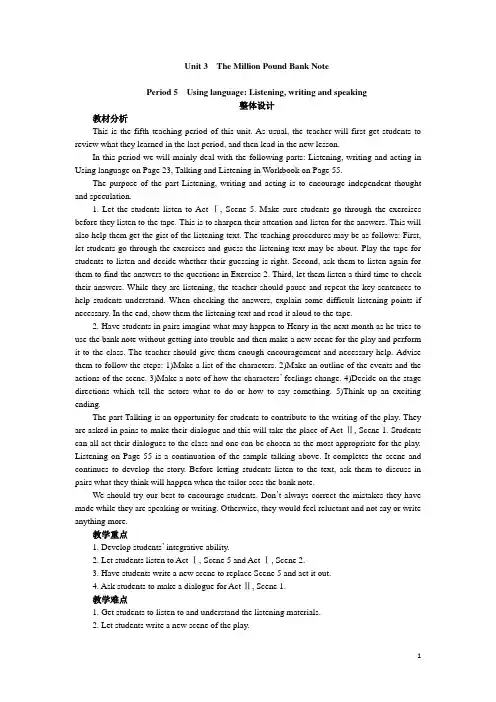
Unit 3The Million Pound Bank NotePeriod 5Using language: Listening, writing and speaking整体设计教材分析This is the fifth teaching period of this unit. As usual, the teacher will first get students to review what they learned in the last period, and then lead in the new lesson.In this period we will mainly deal with the following parts: Listening, writing and acting in Using language on Page 23, Talking and Listening in Workbook on Page 55.The purpose of the part Listening, writing and acting is to encourage independent thought and speculation.1. Let the students listen to Act Ⅰ, Scene 5. Make sure students go through the exercises before they listen to the tape. This is to sharpen their attention and listen for the answers. This will also help them get the gist of the listening text. The teaching procedures may be as follows: First, let students go through the exercises and guess the listening text may be about. Play the tape for students to listen and decide whether their guessing is right. Second, ask them to listen again for them to find the answers to the questions in Exercise2. Third, let them listen a third time to check their answers. While they are listening, the teacher should pause and repeat the key sentences to help students understand. When checking the answers, explain some difficult listening points if necessary. In the end, show them the listening text and read it aloud to the tape.2. Have students in pairs imagine what may happen to Henry in the next month as he tries to use the bank note without getting into trouble and then make a new scene for the play and perform it to the class. The teacher should give them enough encouragement and necessary help. Advise them to follow the steps: 1)Make a list of the characters. 2)Make an outline of the events and the actions of the scene. 3)Make a note of how the characters’ feelings change. 4)Decide on the stage directions which tell the actors what to do or how to say something. 5)Think up an exciting ending.The part Talking is an opportunity for students to contribute to the writing of the play. They are asked in pains to make their dialogue and this will take the place of Act Ⅱ, Scene 1. Students can all act their dialogues to the class and one can be chosen as the most appropriate for the play. Listening on Page 55 is a continuation of the sample talking above. It completes the scene and continues to develop the story. Before letting students listen to the text, ask them to discuss in pairs what they think will happen when the tailor sees the bank note.We should try our best to encourage students. Don’t always correct the mistakes they have made while they are speaking or writing. Otherwise, they would feel reluctant and not say or write anything more.教学重点1. Develop students’ integrative ability.2. Let students listen to Act Ⅰ, Scene 5 and Act Ⅰ, Scene 2.3. Have students write a new scene to replace Scene 5 and act it out.4. Ask students to make a dialogue for Act Ⅱ, Scene 1.教学难点1. Get students to listen to and understand the listening materials.2. Let students write a new scene of the play.三维目标知识目标1. Get students to learn some useful new words and expressions in the listening passages.2. Get students to listen to the play.3. Let students learn the expressions of expressing requests.能力目标1. Develop students’ listening skills and enable them to learn how to use different listening strategies to listen to different listening materials.2. Enable students to write a new scene of the play and act it out.3. Have students learn how to use the expressions to express requests.情感目标1. Stimulate students’ interest of learning English by listening to, writing and acting this play.2. Develop students’ sense of group cooperation and teamwork.教学过程→Ste p 1 Revision1. Check the homework exercises.2. Ask some students to act out Act Ⅰ, Scene 4.→Step 2 Warming up1. Ask some students to retell the story about Act Ⅰ, Scene 4 in their own words.2. Let students predict what they think Henry will do or where he will go next and give their reasons.3. Tell students: We are going to listen to Act Ⅰ, Scene 5. Listen carefully and check your ideas.→Step 3 Listening: Act Ⅰ, Scene 51. Play the whole tape for students to listen to and check whether their prediction is right or not.2. Go through the following questions to make sure the students know what to do.Show the following on the screen.1)Why does Henry worry when he leaves the restaurant?2)Why can’t he see the two brothers again?3)What do the two brothers ask him to do?3. Play the tape again for them to find their answers.4. They discuss and share their answers with their partner.5. Let them listen to the tape a third time for checking and have the correct answers.6. Give 2 or 3 minutes to the students to ask questions if they have any.7. Show the students the listening text and let them read it aloud.→Step 4 Writing1. Let students in pairs imagine what may happen to Henry in the next month as he tries to use the bank note without getting into trouble.2. Have them make a short list of their ideas and choose a best one to make a new scene for the play.3. Show the following on the screen to help them.When you write your play, make sure to follow the steps:1)Make a list of the characters.2)Make an outline of the events and the actions of the scene.3)Make a note of how the characters’ feelings change.4)Decide on the stage directions which tell the actors what to do or how to say something.5)Think up an exciting ending.The beginning of the scene has been already done for you:Act Ⅰ, Scene 5NARRATOR: Henry smiles as he leaves the restaurant. When he is walking down the street, he sees a sign fora barber’s shop. In a shop window, he looks at his own hair. Since it is too long, he decides to get i t cut.HENRY: Good afternoon, I’d like to get a cut.BARBER: . . .4. Ask the students to write their new scene.5. Let some of them read their play to the class. Others should give comments.Model Scene:N=Narrator H=Henry B=BarberAct Ⅰ, Scene 5N: Henry smiles as he leaves the restaurant. When he is walking down the street, he sees a sign for a barber’s shop. In a shop window, he looks at his own hair. Since it is too long, he decides to get it cut.H: Good afternoon, I’d like to get a cut.N: The barber takes one look at Henry and continues cutting another man’s hair.H: Er. . . I’d really like to get a haircut. As you can see it’s much too long.N: The barber speaks in a rude mannerB: Yes, I can see that. Indeed, I can.H: Fine, well, I’ll just have a seat then.N: After some time, the barber finishes cutting the other man’s hair, takes his money, and then turns to look at Henry.B: Looks like it’s been a long time. You must be a sailor.H: Er. . . not quite. But I was at sea for a long time.B: All right, then, get in the chair and I’ll see what I can do.H: Thank you.B: Where did you say you were from?H: I didn’t, but I’m from San Francisco.B: Well, you’re a long way from home.H: Yes, too long.N: They both become quiet. After his hair is cut, the barber tells Henry how much he must pay. Henry shows the barber the bank note.B: Why, Mr. . . .N: He looks shocked.H: Adams. Henry Adams. I’m sorry, I don’t have any small bills.B: Why, Mr. Adams, of course you wouldn’t!N: He’s wearing a big smile.B: Nothing to worry about! Nothing at all! Please come back any time, even if you only need two little hairs cut! It will be my honor to serve you!→Step 5 Talking1. Show the following form on the screen. Let students read the expressions aloud, and make sure they understand their Chinese meanings.I’d like to have. . . Do you have any. . . ?May/Can I help you? What can I do for you?Can you show me. . . , please? May I try it on? How much is it/are they?I’ll take it.Just have a look.What about this one? Did you find everything OK?Is that everything?That’s all we have.2. Suppose the situation: After reading the letter from the brothers, Henry puts it into his coat pocket. Then he notices that his coat is worn out. So he finds a tailor’s shop and goes in to get a new coat. In pairs make a dialogue for Act Ⅱ, Scene 1 using the following information.1)Henry goes into a shop and tells the salesman that he wants a new coat.2)The salesman shows him a cheap coat downstairs.3)Henry doubts if he should take it.4)The salesman persuades him to buy it.5)Henry agrees, but explains that he can’t pay him right now as he has no small change.6)Henry shows the million pound bank note to him.3. Give several minutes for students to prepare their dialogue in pairs.4. Ask as many pairs as possible to present their dialogue to the class.Model Scene:H=Henry1st C=1st clerk2nd C=2nd clerk3rdC=3rd clerkH: (reading the sign)“Clothes make the man. ” Hmm. . . well, we will have to see about that. (He enters a tailor’s shop and stands before a clerk. )I’d like to have a suit coat ready to wear.1st C: (in a rude manner)See him there. (He points to another clerk. )2nd C: (also rude)Ready-made suits? Downstairs.H: Can you show me a suit, please?3rd C: Yes, I can, sir. This way, please.H: I thought you might have a coat another customer decided not to buy.3rd C: (looking at him with a frown)Ah, here we are, the very thing you need.O: Tell Todd to serve that man quickly and let him out the side door.1st C: Yes, sir.H: (trying on an ugly coat)So is this sort of thing that’s worn in England nowadays?3rd C: Oh, yes, it’s all the fashion.1st C: (pulling the third clerk aside and whispering)Mr. Reid says you’ve got to serve him quick and get him out quick!3rd C: I know what I’m doing. I’ve got eyes, haven’t I?H: It’s a little too colorful, isn’t it?3rd C: It’s all we have in your size.H: Well, I’ll take it.3rd C: Good. Shall I put it in a box?H: No. I’ll wear it. Oh, I’d rather not pay you now. I’d like to open an account and pay in a month. You see, I don’t have any small change.3rd C: (trying not to show he is angry)I suppose a gentleman like you only carries very large bills.H: Now, look here, you shouldn’t judge people by the clothes they wear. I just don’t want to cause you trouble with a large note.3rd C: It’s no trouble at all.H: In that case, there’s no problem. (He gives the clerk the bank note. )→Step 6 Listening on Page 551. Before listening, let students in pairs discuss what they think will happen in the tailor’s shop after Henry shows the salesman and the owner the bank note.2. Ask them to turn to Page 55 and read through the exercises. Make sure they know what to do.3. Play the tape for them to listen to and write down three things that happen in this scene.4. Ask them to listen again and answer the questions in groups.Show the following on the screen.1)Why doesn’t the salesman give Henry his change right away?2)Is the owner really angry at the salesman or does he just pretend to be angry? How do you know?3)Is Henry glad to get more than one coat? How do you know?4)Henry tells the owner that he is moving. Give two reasons why the owner is not surprised to hear this news.5)What does the owner offer to do for Henry? Why?5. Let students share their answers in pairs.6. Play the tape a third time for them to check and have the correct answers.7. Give 2 or 3 minutes for them to ask questions if they have any.→Step 7 Homework1. Finish off the Workbook exercises.2. Read the related parts of this play again and try to retell them in your own words.板书设计Unit 3The Million Pound Bank NoteListening, writing and speakingWhen you write your play, make sure to follow the steps:1)Make a list of the characters.2)Make an outline of the events and the actions of the scene.3)Make a note of how the characters’ feelings change.4)Decide on the stage directions which tell the actors what to do or how to say something.5)Think up an exciting ending.The beginning of the scene has been already done for you:Act Ⅰ, Scene 5NARRATOR: Henry smiles as he leaves the restaurant. When he is walking down the street, he sees a sign fora barber’s shop. In a shop window, he looks at his own hair. Since it is too long, he decides to get it cut.HENRY: Good afternoon, I’d like to get a cut.BARBER: . . .活动与探究Making requests and ordering food are very necessary in our daily life. Find as many useful expressions as possible from the play, read them aloud and try to learn them by heart. Then work in pairs to make up dialogues according to the following situations.Situation 1: At the end of your trip in America, you come to a picture service to have your films developed. You tell the assistant about the exact print type you want and the time to get it.Situation 2: You work for an American company. You catch a bad cold and do not feel well, so you ask the manager, Mr. Smith, for leave of absence. Mr. Smith inquires after you and permits you to take a rest.Situation 3: You are in a fast food restaurant, ordering two hamburgers and French fries, andtwo cakes. You’ll eat in the restaurant.Sample dialogues:Situation 1:A: May I help you, sir?B: Yes, I have got this color film. How long will it take to get it developed?A: Two hours, sir. Do you want ordinary prints or enlarged ones?B: Ordinary prints, please. I wonder if you could get it done earlier. You see, I will be leaving soon.A: Well, in that case, they can be done by ten o’clock. But we will have to charge your extra, you know.B: No problem.Situation 2:A: May I come in?B: Come in, please.A: Could you spare me a few minutes, Mr. Smith?B: You are always welcome. What can I do for you?A: I wonder if you could permit me to have one day off. I had a very bad cold.B: I’m sorry to hear that. Isn’t it any better now?A: I’m afraid not, but I’m sure it’s not serious. I will report on duty as soon as I feel better.B: Well, stay in home and have a good rest.A: Thank you.Situation 3:A: Yes, sir. What will it be for you?B: Two hamburgers and French fries.A: Is there anything else?B: Give me two cakes, please.A: Go or eat here?B: We’ll eat here.A: Here you are. That’s eight fifty.。
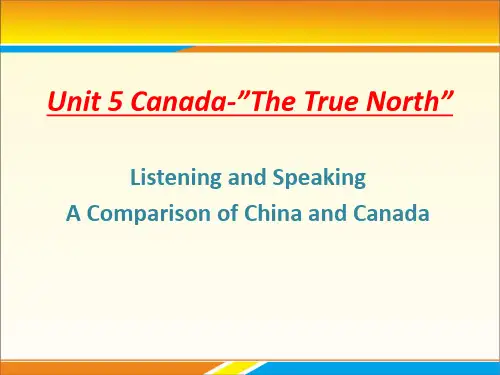
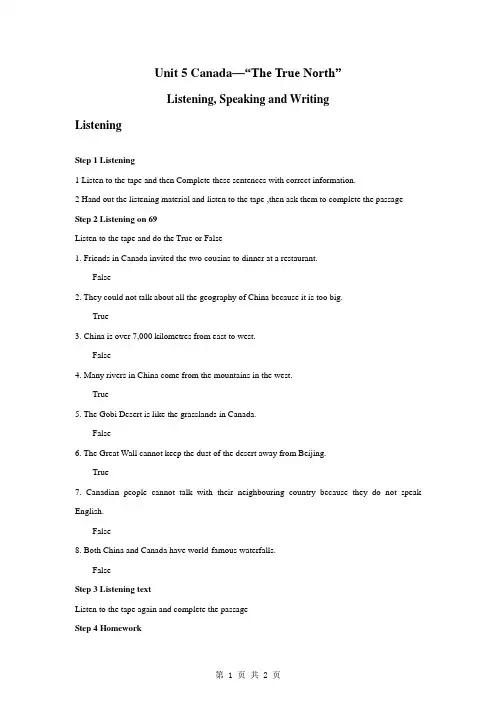
Unit 5 Canada—“The True North”Listening, Speaking and WritingListeningStep 1 Listening1 Listen to the tape and then Complete these sentences with correct information.2 Hand out the listening material and listen to the tape ,then ask them to complete the passage Step 2 Listening on 69Listen to the tape and do the True or False1. Friends in Canada invited the two cousins to dinner at a restaurant.False2. They could not talk about all the geography of China because it is too big.True3. China is over 7,000 kilometres from east to west.False4. Many rivers in China come from the mountains in the west.True5. The Gobi Desert is like the grasslands in Canada.False6. The Great Wall cannot keep the dust of the desert away from Beijing.True7. Canadian people cannot talk with their neighbouring country because they do not speak English.False8. Both China and Canada have world-famous waterfalls.FalseStep 3 Listening textListen to the tape again and complete the passageStep 4 HomeworkRead the listening text and remember the information about CanadaSpeaking and writingStep 1 Warming upShow the students some questions to discussWhich official language do you think most people speak?Why do you think so?Why would you want to know that?Is it important to know that?Why is the Chinese language growing so fast in Canada?Can you answer the question “ what is a Canada?”Step 2 Talking on page69Imagine that you and your partner are Li Daiyu and Liu Qian. You have visited many places from west to east as well as Iqaluit. What would you talk about when you travel?Step 3 WritingWrite a report for Li Daiyu or Liu QianFirst give the sample of the reportStep 4 Writing Task on Page74Show the map of China and discuss something of the mapThen give the sample to the studentsSample Tour PlanStep 5 Homework1. Write a passage. Introduce our hometown to the visitors. In what direction is it of the capital of our province? What does a visitor can see and hear in our hometown?2. Finish summing up on Page40 after class.。
